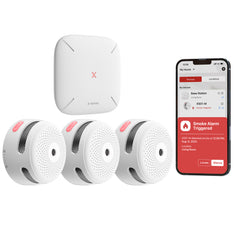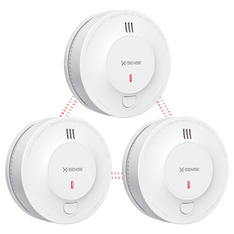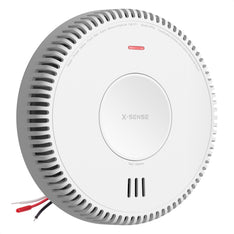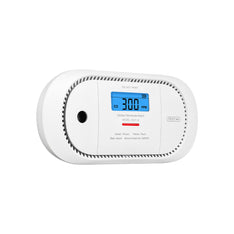Smoke Alarms Without Batteries: What You Should Know
Wed, Oct 29, 2025
Smoke alarms without batteries have been used for years as a reliable solution for home fire safety. These devices are directly connected to the home's electrical system, providing continuous protection without relying on removable batteries. By eliminating the need for battery changes, they reduce maintenance while ensuring households remain alerted to potential fire hazards.
Want to learn more about them? Just read on. This post will explain how smoke detectors without batteries work, their main functions, and key points to consider when choosing the right device for your home.
Do Smoke Alarms Work Without Batteries?
First, let's clarify: do smoke alarms work without batteries? Or, will a smoke detector work without a battery? The answer is yes, depending on the type of alarm.
A smoke detector without a battery typically refers to smoke alarms that are hardwired into the home's electrical system, namely hardwired smoke alarms. However, some people also classify devices that contain a 10-year sealed battery as smoke alarms without batteries because these devices have a longer battery life, lasting up to 10 years without replacement.
Main Functions of Smoke Alarms Without Batteries
Smoke detectors without batteries are a type of smoke alarm that play a vital role in preventing fires and enhancing home safety. They offer several key features that provide a solid foundation for home fire safety.

1. Continuous Smoke Detection
A smoke detector without battery continuously monitors the air for signs of smoke or fire. Because they are hardwired into the home's electrical system, they operate 24/7, unlike battery-powered alarms that may become inoperable when the battery depletes.
2. Early Warning System
When smoke is detected, the alarm sounds a loud siren to alert all occupants. Some hardwired models can also interconnect, ensuring that if one alarm sounds, all alarms in the system sound, alerting the entire home immediately.
3. Low Maintenance Costs
Because they are battery-free, these alarms have lower maintenance costs and require less frequent battery checks or replacements. This also reduces the likelihood of the alarm failing due to battery problems, making them a convenient choice for busy households.
4. Reliable Fire Safety
Smoke alarms without batteries typically have a 10-year lifespan with minimal intervention, providing a reliable and ongoing fire safety solution and peace of mind for homeowners.
How Smoke Alarms Without Batteries Work
Smoke alarms without batteries, also known as hardwired smoke alarms, draw constant power from the home's electrical system, ensuring uninterrupted operation. Some models are interconnected, meaning if one alarm detects smoke, all connected alarms sound simultaneously, alerting everyone in the house.
These alarms typically use photoelectric or ionization sensors to detect smoke particles. Photoelectric sensors are particularly effective at detecting smoldering fires, while ionization sensors respond quickly to fast-burning fires. Some alarms may include both sensors to maximize detection capabilities.
Unlike battery-powered alarms, battery-free smoke alarms do not require regular battery replacement, minimizing the risk of alarm failure due to battery depletion. However, they rely on home electricity, so some families choose models with battery backup or additional fire safety measures to ensure protection during power outages.
Smoke Alarms Without Battery vs. With Battery

Besides hardwired smoke detectors without batteries, there are two other types of devices on the market: hardwired smoke detectors with backup battery and battery-powered smoke detectors. They all have the same main function - detecting smoke - but differ in other aspects.
| Feature | Hardwired without Backup Battery | Hardwired with Backup Battery | Battery -Powered |
| Power Source | Home wiring only | Home wiring and backup battery | Battery (sealed or replaceable) |
| Maintenance | Low, no need to replace the battery | Medium, need to check or replace the backup battery | Medium to high, need to replace batteries if not sealed 10-year type |
| Reliability | High, but affected by power supply | Very high, dual power supplies ensure normal operation during power outages | High, but affected by battery performance |
| Installation | Professional required | Professional recommended | DIY, flexible placement |
| Interconnectivity | Often available | Ofen available; for example, the X-Sense XP04 is a hardwired interconnected smoke and CO alarm providing dual protection. | Sometimes available, depending on the model; for example, the X-Sense XS01-M is a very popular interconnected smoke alarm. |
| Cost | Medium to high (wiring cost) | High (devie + wiring + backup battery) | Low to medium (battery) |
| Typical Use | New constructions | Most modern homes | Apartments, older homes, rental units |
Summary
- Hardwired smoke alarms without batteries offer reliable, low-maintenance protection, making them ideal for long-term home security.
- Hardwired smoke alarms with backup batteries ensure protection during power outages, but require regular battery checks.
- Battery-powered smoke alarms offer convenience and flexibility, but require regular battery checks and replacements.
Each of these three types of smoke alarms has its own advantages and disadvantages, suitable for different types of homes and users. Therefore, you need to determine your home type and maintenance preferences before making a choice.
Installation and Maintenance Tips
After selecting and purchasing the appropriate detector, you need to install it correctly and perform regular maintenance. Here are some practical tips:
- Professional Installation: Hardwired alarms should be installed by a qualified electrician to ensure proper wiring and interconnectivity.
- Placement: Install alarms in hallways, living areas, and near bedrooms for optimal coverage.
- Routine Checks: Test alarms monthly and clean them regularly to prevent dust or debris from affecting performance.
- Power Outages: If using hardwired-only models, consider additional fire safety measures or backup options.

FAQs About Smoke Alarms Without Batteries
Q1: Are there smoke alarms without batteries?
Yes. Hardwired smoke alarms without backup batteries operate without relying on removable batteries.
Q2: Can a smoke detector work without a battery?
Yes, if it is a hardwired model without battery dependency. Battery-powered models will not function without a battery.
Q3: Do smoke alarms without battery provide sufficient safety?
Yes, they offer reliable protection under normal conditions. For power outage scenarios, backup measures or alarms with battery options may be advisable.
Q4: How often should smoke alarms without battery be checked?
Test monthly and clean regularly. Since they don't rely on removable batteries, maintenance is minimal compared to battery-powered models.
Q5: Is it better to have a battery or hardwired smoke detector?
A hardwired smoke detector with a backup battery is best because it's more reliable and keeps working during power outages. Battery-powered models are easier to install.
Conclusion
Smoke alarms without batteries provide continuous, low-maintenance fire protection, reducing the risk of alarm failure due to dead batteries. By understanding how they work, their main functions, and how they compare to other smoke alarm types, homeowners can make informed choices for optimal home safety. Proper installation and regular testing ensure these devices continue to safeguard your household for years.
You may also want to read:
Have Fun and Stay Safe with These Halloween Safety Tips!
Full Fire Extinguisher Refill Guide: What, When & How
Best Smoke Alarms for 2025: Top 5 Compared
PASS Fire Extinguisher: Step-by-Step Guide for Beginners
What Is Home Assistant and How It Powers Smart Home Automation






